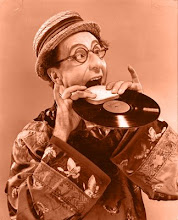Brown and Carney: The Monkees of Obscure Comedy Teams

On the obscure comedy front, Bill Sherman has posted an interesting blog entry re: the RKO comedy team of Brown and Carney. It seems that TCM has showcased a couple of Brown and Carney flicks this month as a part of their April Fools movie lineup. Unfortunately, the films TCM chose to showcase are B&C's Adventures of a Rookie (1943) and Seven Days Ashore (1944). It's as if TCM doesn't want people to like Brown and Carney! To those of you out of the obscure comedy team loop, Wally Brown and Alan Carney were a couple of lumpy, not entirely untalented utility comics RKO individually had under contact in the early 40s before suddenly slapping them together into a "comedy team", or, rather, an amazingly lifelike simulation of one. It has often been suggested that they were RKO's own version of Abbott and Costello, which I don't entirely buy. It's an unfair comparison (mostly to A&C) as it sets people up to expect a brand of comedy that Brown and Carney simply don't/can't/won't deliver. How are Brown and Carney not Abbott and Costello? Let me count the ways:
Personalities
Abbott and Costello
Abbott and Costello
Bud Abbott: Bud portrays a comic villain; a conniving, greedy, and frequently cruel con artist, a living symbol of man's inhumanity to man. Incapable of upward social mobility, he reaffirms his frail sense of superiority by kicking downwards.
Lou Costello: Lou portrays a hapless, bumbling everyman, the poor dope his mentor and "friend" Bud kicks downwards at. Sweet-natured Lou is so blissfully disconnected from the world around him that he frequently transcends "reality" and is capable of what appears to those around him to be impossible. A neurotic man-child in a world of cruel adults, Lou tragically clings to the opportunistic Bud as his father-figure which naturally leads to all sorts of zany, madcap situations.
Brown and Carney
Wally Brown: Brown plays a friendly sort of guy who has a bit of a cowardly streak. He pushes Carney around sometimes. Usually not, though. He sets up the straight lines so Carney can make with the funny comebacks. But that's not always the case, either.
Alan Carney: Carney portrays Brown's slightly dimmer foil when Brown isn't playing his foil. Seems frequently confused if not outright dazed.
Appearance
Abbott and Costello
Abbott and Costello
Bud Abbott: Tall and angular. Took to wearing a thin mustache in the 1950s which made him look even more like a racetrack tout from a Damon Runyon story.
Lou Costello: Short and pudgy yet capable at times of an almost balletic grace. Has the face of a disgraced cherub.
Brown and Carney
Wally Brown: Five foot six, slightly chunky with rubbery features.
Alan Carney: Five foot four, chunky with rubbery features.
Comedy
Abbott and Costello
Abbott and Costello
Much of this team's comedy derives from the friction between their characters. A&C possessed a seemingly bottomless bag of burlesque routines which they had honed to perfection after years of experience on the stage.
Brown and Carney
Completely dependent on who happens to be writing their lines, mostly RKO's reliable if unremarkable stable of B-movie scribes.
Here's the real connection between the teams: RKO, like the rest of Hollywood, reacted to Abbott and Costello's phenomenal success in Buck Privates (1941) by trying to cash in on what they saw as a new trend for military comedies; preferably military comedies starring comedy teams. 20th Century Fox hired Laurel and Hardy for the dreadful Great Guns (1941) while the smaller RKO decided to save scratch by simply manufacturing their own comedy team to star in a slew of Buck Privates-ish service comedies. But The Adventures of a Rookie is no Buck Privates, and neither is Rookies In Burma or Seven Days Ashore. With their nebulous characterizations and distinct lack of comic "business", Brown and Carney barely qualify as a pale imitation of Abbott and Costello. They were barely even a pale imitation of a comedy team.
However, after an abysmal start, things did improve for Brown and Carney once they left the service comedies behind, although they never really gelled as a team. Girl Rush (1944), a comedy western, is probably their best feature (and co-stars a young Robert Mitchum.. in drag, no less). They have more comic patter than usual here and they almost seem like a real comedy team rather than two comics standing next to each other. Brown and Carney also starred in a very strange horror comedy entitled Zombies On Broadway (1945) with Bela Lugosi and Sheldon Leonard. Freak that I am, I actually prefer Zombies On Broadway to Abbott and Costello Meet Frankenstein, the horror comedy Universal released three years later. While A&CMF was Universal's burlesque of their famous monster movies, ZOB was RKO's comic follow-up to their own big 1940s horror hit, Jacques Tourneur's 1943 classic I Walked With a Zombie. Unlike Universal's horror burlesque, however, ZOB features some legit horror atmosphere and a few genuinely disturbing visuals. Brown and Carney's best film as supporting characters is 1944's Step Lively, a musical comedy based on the same Broadway play that served as the basis for RKO's 1938 Marx Brothers oddity Room Service. Frank Sinatra plays the Frank Albertson role of the idealistic playwright, while Brown and Carney stand in for Chico and Harpo (George Murphy plays Groucho's Gordon Miller role). The team was disbanded by RKO following their 1946 comedy mystery Genius At Work (co-starring Lugosi and, for the last time anywhere, Lionel Atwill).











